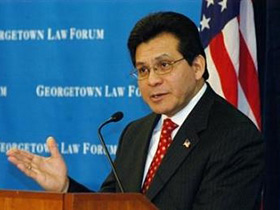 |
 |
 |
 News from Around the Americas | February 2006 News from Around the Americas | February 2006  
Gonzales to Downplay Spy Program's Scope: Time
 Reuters Reuters


| | U.S. Attorney General Alberto Gonzales speaks about domestic wiretapping policies in the United States during an appearance at Georgetown University's 'Georgetown National Law Forum' in Washington. (Evan Sisley/Reuters) |
Washington - U.S. Attorney General Alberto Gonzales plans to tell a Senate committee on Monday that President George W. Bush's warrantless domestic surveillance program is carefully targeted and "not a dragnet," Time magazine reported on its Web site on Saturday.

Citing Bush administration documents, Time said Gonzales will say that contrary to speculation in media reports, the program "is not a dragnet that sucks in all conversations and uses computer searches to pick out calls of interest."

"No communications are intercepted unless first it is determined that one end of the call is outside of the country and professional intelligence experts have probable cause ... that a party to the communication is a member or agent of al-Qaeda or an affiliated terrorist organization," Time quoted Gonzales as saying in written responses to questions by Senate Judiciary Committee Chairman Arlen Specter.

Critics charge that the National Security Agency program violates the U.S. Constitution and the 1978 Foreign Intelligence Surveillance Act, or FISA, which makes it illegal to spy on U.S. citizens in the United States without the approval of a special secret court.

Gonzales plans to say that seeking approval for wiretaps from the secret court could lead to delays that "may make the difference between success and failure in preventing the next attack," Time said.

He also plans to leave open the possibility that Bush will seek blanket approval from the FISA court for the surveillance program, the magazine said.

Specter, a Republican from Pennsylvania, asked Gonzales in writing ahead of his committee's hearing whether FISA court approval for the program would be sought, the magazine said.

Time said that Gonzales replied, "We use FISA where we can, and we always consider all of our legal options."

The attorney general's comments are part of the administration's vigorous defense of the domestic spying program after The New York Times exposed it in December.

It was authorized by Bush to monitor the international telephone calls and e-mail messages of U.S. citizens without first obtaining warrants as a means of helping track down al Qaeda suspects following the September 11 attacks.

The administration refers to the eavesdropping as a limited "terrorist surveillance program" and says it is justified by Bush's role as commander in chief and by the congressional authorization of military force he was granted after the 2001 attacks on New York and Washington. | 
 | |
 |



